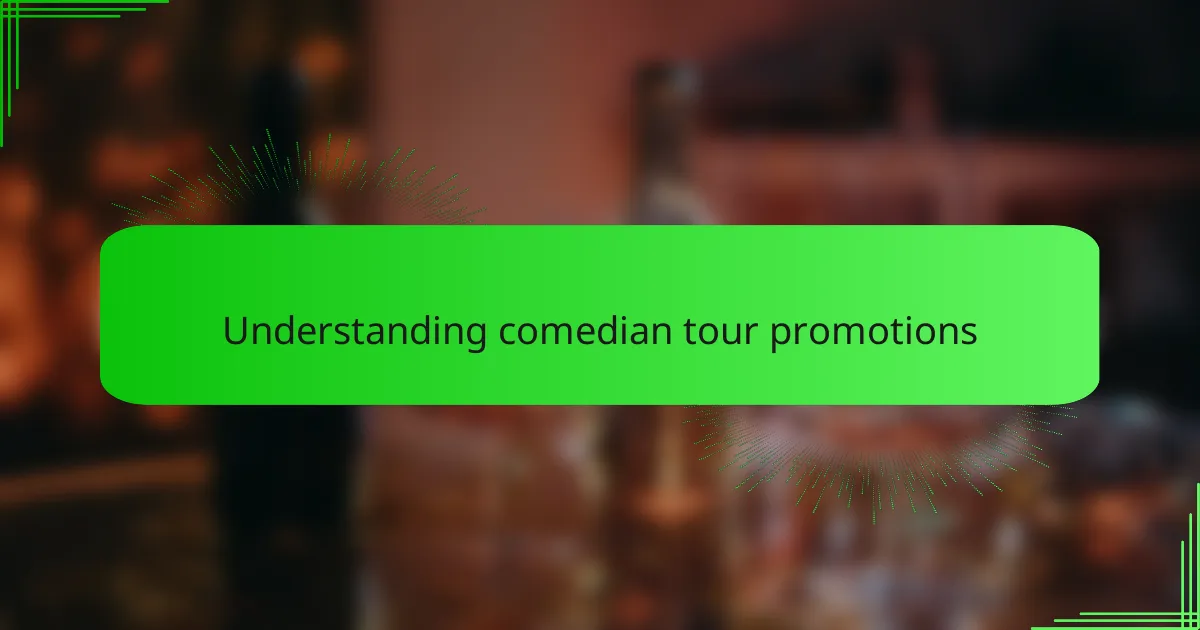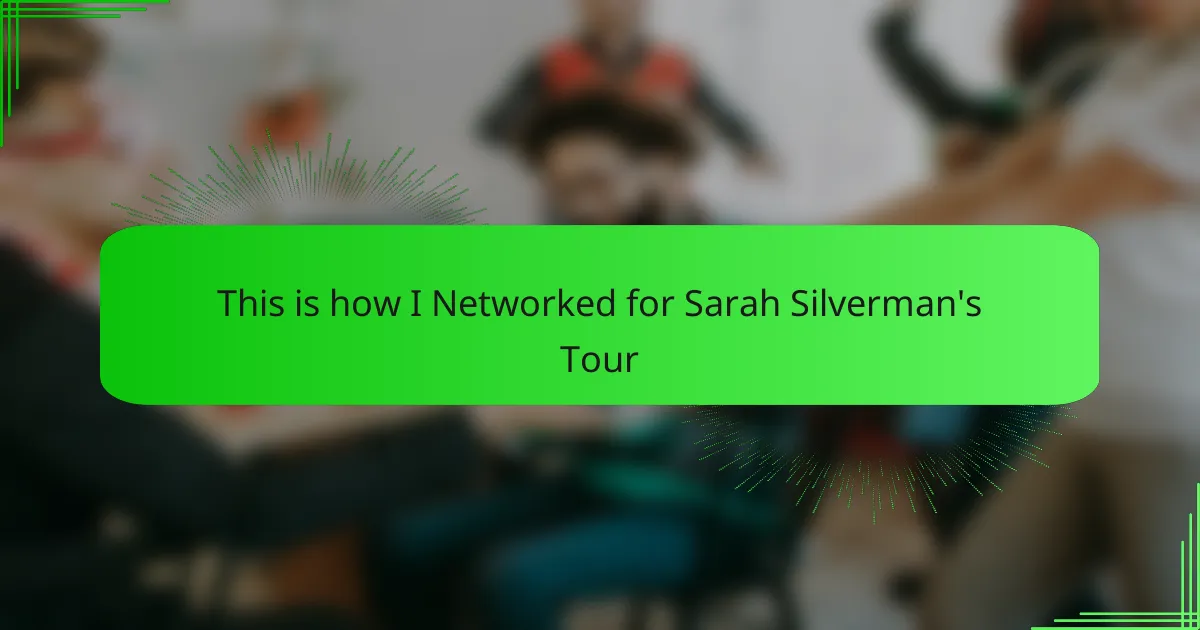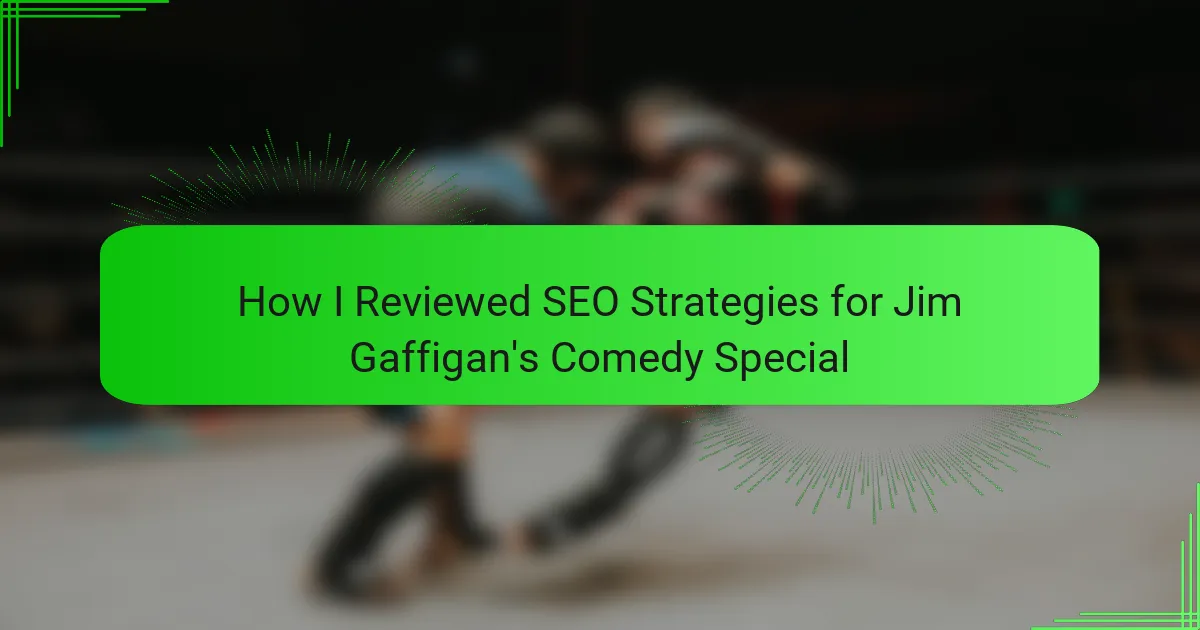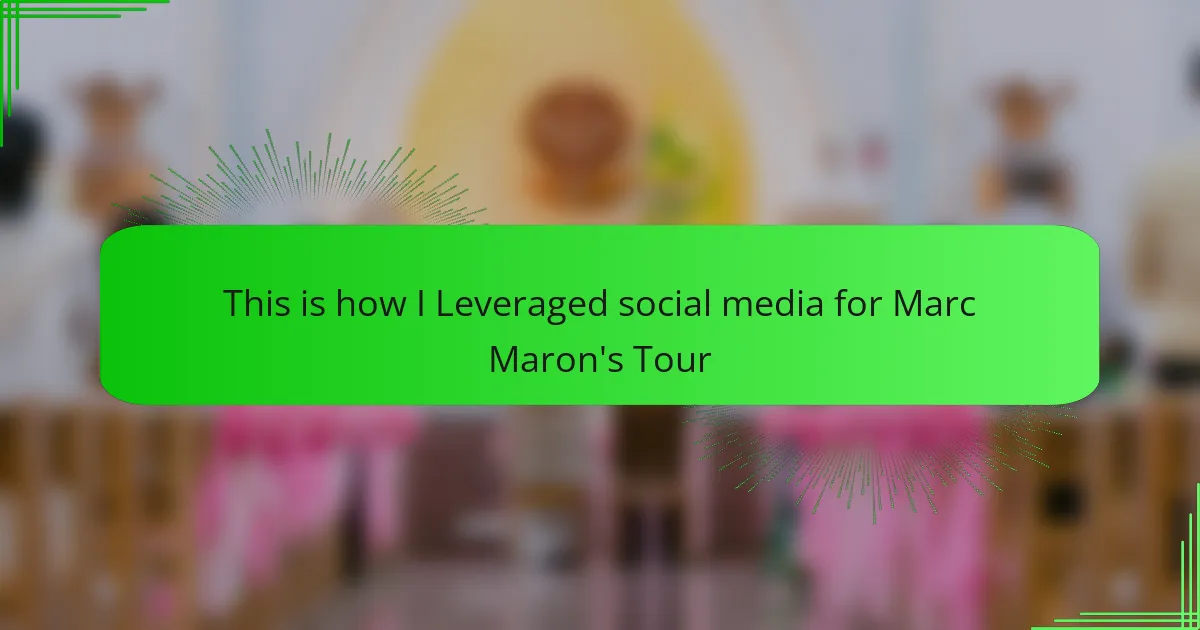Key takeaways
- Effective comedian tour promotions rely on a mix of social media engagement and community building to foster authentic connections with audiences.
- Networking in the comedy scene is essential for creating opportunities, sharing resources, and establishing a supportive community among performers.
- Building genuine relationships through shared experiences and feedback enhances networking effectiveness and encourages collaboration.
- Leveraging social media strategically, including engaging content and influencer partnerships, can significantly amplify promotional efforts for tours.

Understanding Comedian Tour Promotions
When it comes to comedian tour promotions, understanding the landscape is crucial. I’ve found that leveraging social media can create significant buzz, as fans are more likely to engage with content they’ll feel personally connected to. Promoting a comedian’s tour isn’t just about ticket sales; it’s about building a community around the brand and the artist.
In my experience, each promotional strategy can have a vastly different impact. For example, local events and partnerships can generate excitement and reach differing demographics compared to online ads. I’ve noticed that a well-thought-out promotional strategy considers both the audience and the unique voice of the comedian, leading to more authentic connections.
Here’s a simple comparison of traditional marketing methods versus digital approaches in comedian tour promotions.
| Traditional Marketing | Digital Marketing |
|---|---|
| Print ads in newspapers | Social media campaigns |
| Radio spots | Email newsletters |
| Flyers and posters | Influencer partnerships |

Importance of Networking in Comedy
Building a strong network in comedy is crucial because it opens doors to opportunities that might otherwise remain closed. I remember when I first started; every connection I made felt like a small victory. Whether it was meeting fellow comedians or industry professionals, each interaction taught me something valuable and infused me with motivation.
Effective networking not only helps comedians to share resources but also creates a sense of community, which is vital in an often solitary profession. I’ve found that these relationships can lead to collaborations, gigs, and invaluable advice that shapes one’s comedic journey. Here are some key reasons why networking is essential in comedy:
- Expands your reach to potential audiences, venues, and collaborators.
- Provides support and encouragement through shared experiences.
- Enhances learning through exposure to diverse perspectives and styles.
- Increases opportunities for mentorship from seasoned professionals.
- Fosters a sense of belonging within the comedy community.

Strategies for Effective Networking
When I think about effective networking strategies, I often reflect on my experience reaching out to industry professionals before Sarah Silverman’s tour. Building genuine connections is essential; I remember attending comedy shows where I would strike up conversations with fellow comedians and even back-end staff. It’s amazing how a simple chat can open doors.
To make the most out of networking opportunities, consider these strategies:
- Attend live shows: Engaging with performers and crew after shows can lead to valuable connections.
- Leverage social media: Platforms like Twitter and Instagram are excellent for reaching out to comedians and promoters directly.
- Join comedy workshops or classes: Immerse yourself in community settings where you can meet like-minded individuals.
- Follow up: Sending a quick message after meeting someone can reinforce the connection. I often share my favorite moments from our conversation to keep the dialogue alive.
- Stay authentic: I always find that being myself resonates with others, making it easier to build lasting relationships.

Building Connections in the Comedy Scene
Building connections in the comedy scene is essential for any promoter looking to succeed. From my experience, every comedian has a unique journey, and understanding their stories can create stronger bonds. I remember the first time I attended an open mic night—feeling nervous but excited. Watching comedians share their vulnerabilities allowed me to appreciate the depth of the art form and motivated me to reach out and connect.
Networking isn’t just about exchanging contact information; it’s about building relationships. I found that sharing feedback with comedians after their sets helped me forge genuine connections. Honestly, the smallest gesture, like complimenting a punchline or engaging in a post-show conversation, can make a lasting impression and open doors.
Here’s a simple comparison table that captures the essence of building connections in the comedy scene:
| Aspect | Importance |
|---|---|
| Networking Events | Facilitate direct interactions |
| Feedback | Builds trust and rapport |
| Shared Experiences | Strengthens community ties |

Leveraging Social Media for Promotion
Social media has become an integral tool in promoting events like Sarah Silverman’s tour. I remember when I started sharing snippets of her upcoming shows on my platforms; the buzz created was palpable. Engaging with fans through platforms like Instagram and Twitter not only helped spread the word but also fostered a real sense of community around her brand.
When leveraging social media for promotion, consider these key strategies:
- Create Engaging Content: Share funny clips, behind-the-scenes footage, or personal stories related to the tour to draw in followers.
- Utilize Hashtags: Use relevant hashtags to increase visibility and tap into existing fan conversations.
- Host Live Q&A Sessions: Engage fans directly by answering their questions about the tour; it builds excitement and a personal connection.
- Collaborate with Influencers: Partner with other comedians or influencers to reach their audience and boost ticket sales.
- Encourage User-Generated Content: Invite fans to share their experiences and tag the tour, creating a sense of ownership and involvement in the promotion.
By sharing my own experiences on social media, I’ve seen the power of community grow, making the journey of promoting the tour a truly collaborative effort.

Personal Experiences from Networking
Networking for Sarah Silverman’s tour was an eye-opening experience. I vividly remember my first connection with a fellow comedy enthusiast at an open mic night. We bonded over our shared admiration for Sarah’s bold humor, which led to an exchange of ideas that not only helped me in my promotion efforts but also blossomed into a genuine friendship.
Through such interactions, I learned the importance of being authentic and open in conversations. One can easily get lost in the hustle, but it’s those personal touchpoints that create lasting relationships. Each connection I made felt like a small victory, reaffirming that networking isn’t just about exchanging contact information—it’s about building a community where we uplift each other’s work.
Here’s a comparison of my networking experiences before and during the tour:
| Before Networking | During Networking |
|---|---|
| Limited connections | Expanded professional network |
| Felt isolated | Gained supportive friendships |
| Lack of ideas | Flow of creative collaboration |

Tips for Successful Tour Collaborations
Creating successful collaborations for a tour can feel overwhelming, but a few key strategies can set you apart. I remember when I teamed up with local artists to promote Sarah Silverman’s tour; pooling our resources really elevated our efforts. The excitement we shared about the tour ignited a passion in our networks, helping us spread the word more effectively than I could have done alone.
When approaching potential collaborators, consider these essential tips:
-
Build genuine relationships: Invest time in getting to know the people you want to work with. Authentic connections lead to more fruitful collaborations.
-
Define mutual goals: Ensure that all parties have a clear understanding of what each collaborator hopes to achieve. This alignment can prevent misunderstandings later on.
-
Leverage social media: Use platforms effectively to promote joint efforts, share successes, and keep the excitement alive. I found that cross-promotion exponentially increased engagement.
-
Follow up: After the collaboration, checking in with partners maintains relationships and opens doors for future projects. I’ve often found that these post-tour conversations lead to exciting new ideas!
Remember, successful collaborations are all about creating win-win situations where everyone feels valued and excited to contribute.


